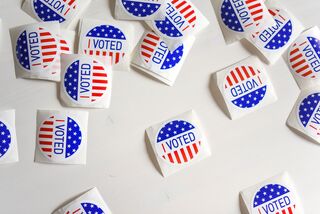Testosterone
How Midterm Election Results Can Hurt Your Profits
Here's how to stop politics from impacting your testosterone, and your wallet.
Posted November 14, 2022 Reviewed by Gary Drevitch
Key points
- Disappointing political election results can seriously lower your testosterone levels.
- Testosterone levels have been found to predict day trading profits in financial markets studies.
- Subsequently, taking a break from trading immediately after an election may help to avoid unprofitable trading decisions.

Last Tuesday, Nov. 8, 2022, was a historic day. A balmy autumnal evening began to draw in across America as midterm results started to trickle in.
Election night parties across every state in the US played host to countless buoyant voters, primed to celebrate what they felt would be an inevitable win for their candidate. Drinks flowed as red, white, and blue balloons remained static in their ceiling nets, ready to fall the moment victory was called. Regardless of whichever federal or state election race voters were ready to honour, the 2022 midterms made history as the most expensive on record, costing a record $16.6 billion. Shattering election spending records, it was a sign that there was (and is) much at stake.
As results started to roll in, the anticipation was palpable.
Then it happened. Suddenly, a projected "red wave" fell away. Clearly, political pundits had overstated the case for many candidates. And for many voters, a promised landslide turned, depressingly, into little more than a slow burn. Their guy, slated to storm to victory only hours before, became stuck in a runoff, calls were delayed, or worse, he ended up losing. Democratic and Republican voters both suffered unexpected surprises in the election. The result? Parties and jubilation fizzling out, bombastic anticipation replaced by dejection.
We’ve all experienced this exact feeling at some time. When an election doesn’t go your way, the disappointment can be crushing. But here’s a crazy fact: You know what else might get crushed?
Tomorrow’s trading returns.
Yes, you read that right: The physiological changes that take place on election night can materially affect the profitability of your trading and investing the morning after. Here’s how you can protect your sanity – and your wallet – after a political call that didn’t go your way.
Lessons From History
But before we get to that, let’s take a brief step back, set the scene, and recall what exactly happened last week. Historically, all data indicated the likelihood of a sizeable Democratic loss. As political polling analysts FiveThirtyEight rightly report, a sitting President will almost always experience a negative midterm election result; in fact, an incumbent has won House seats in midterm elections only three times since 1908. Factoring in recessionary and inflationary fears, an ongoing Russian threat, and escalating energy prices, American politics seemed primed for a Republican landslide. In fact, for many commentators, a Red Wave was a de facto outcome and a relatively foregone conclusion.
Yet that Red Wave simply did not materialise. And that unexpected outcome meted out a powerful neurological response on many voters.

Politics: A Primal Instinct
If you’re a passionate voter on either side of the aisle, your physiology will react powerfully when you absorb a disappointing result. Neuroscientists at Duke University, for example, recently reported that the testosterone levels of males drop rapidly among voters of a losing political party. Now, falling testosterone can impact anything from confidence to motivation and can be a game changer in altering our behaviour and risk preferences, so it’s important we are aware of this kind of drop when it happens.
Interestingly, if a political loss was generally unexpected – a genuine shock — those physical responses will be even more impactful.
Following a political loss and an inevitable, vicarious fall in testosterone, levels of cortisol, a stress hormone, will also rise. That is because cortisol reacts most powerfully to uncertainty — such as waiting for the results of a close political runoff through the night. Cortisol downregulates testosterone, which exacerbates physiological shifts that can affect your emotions.
We then have to factor in the anticipation effect: Pre-election, we savour what we believe to be the anticipation of a delicious victory by our candidate. This anticipatory effect spikes dopamine – a wonderful reward hormone that lifts us up and preps us for a great election party night. But when our candidate fails to deliver, our brain processes our bad call (scientifically referred to as a negative prediction error), and quickly lowers levels of dopamine. This combination of lower dopamine and higher cortisol actively lowers circulating levels of blood testosterone even further. And that can lead to low confidence, a depressed mood, demotivation, and fatigue.
Put bluntly, regardless of which side of the aisle on which you stand, any political defeat is going to be felt by your body as a crushing, testosterone-blunting, dopamine-stunting hit.
But why is this a problem for your investments?
Testosterone and Trading
Research conducted with financial markets traders tells us that adequate levels of dopamine seem to be a staple of positive trading returns, so post-election night dopamine slumps might throw you into precariously unprofitable trading territory.
Further, studies also show us that testosterone levels can be directly linked to trading returns. For example, research conducted by the University of Cambridge reported that high testosterone levels in financial markets traders was positively correlated with higher day trading profits.
Low levels of testosterone? You’re more likely to see poorer returns.
Football and Finance
It gets worse if your favourite team struck out recently, too.
A recent clinical study from the University of Utah reported that sports spectators experience a vicarious rise in their own testosterone if their team wins – and a fall in testosterone if they lose.
So that might mean that a Panthers fan who not only sat through their team’s 21-42 defeat to the Cincinnati Bengals last Sunday but then had to witness their Republican favourite Sandy Smith narrowly lose to Democrat opponent Don Davis, would conceivably suffer a major two-step hit to their testosterone levels.
Political Animals
The upshot: Trading profits are linked to testosterone levels, so opening your trading account the morning after the night before a depressing election result may well be a very bad call. To safeguard your profits, waiting a couple of days isn’t a bad strategy. And being aware of the major physiological shifts that political (and sports) results can mete out on your physical and emotional health is no bad thing, either.
And there’s one more thing. According to research, this post-election testosterone effect is only present in males. Female traders, as it turns out, tend to exhibit a generally greater risk aversion, a tendency to trade less, a propensity for higher returns, and little vicarious hormonal change after witnessing major sports or political losses. Perhaps that is why financial markets researchers recently concluded that hiring more female traders might offer one great way of improving investment company returns.
Who knows? It might offer a profitable step forward in politics, too.




